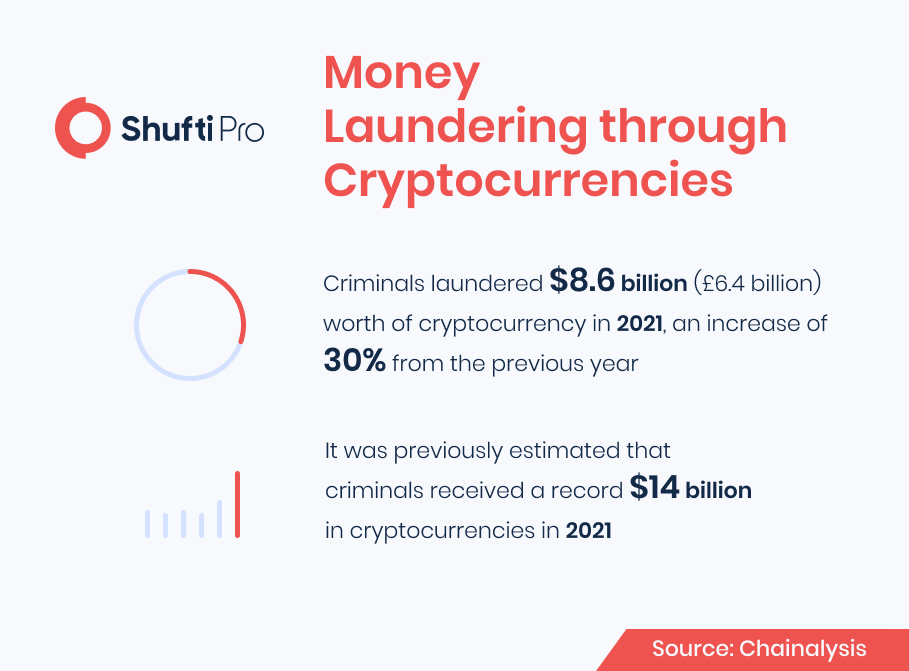
AML Compliance for the Crypto Sector – How VASPs Can Adhere to the Regulations



BEFORE YOU GO...
Check how Shufti Pro can verify your customers within seconds
Request DemoNo thanks
With cryptocurrencies gaining traction and entering the mainstream, financial regulators are assessing the risks related to financial crimes like money laundering and terrorist financing. The question is how crypto firms can design and implement a solution that essentially improves their oversight on transactions and transfers of digital currencies.
Crypto firms not only need to analyze the risks associated with their customers but also need to consider the upcoming trends, use cases, and regulatory updates. That’s not all, the biggest challenge is the threats emerging from anonymous transactions made through crypto wallets or Bitcoin ATMs.
Cryptocurrencies are growing in terms of both popularity and adoption with innovations in the technology that makes the financial system work. However, these developments do not come without risks, as financial experts believe that the main weak point of the digital currency sector is the lack of sufficient AML compliance regulations. Initially, the best practices to prevent fraud and eliminate money laundering in the crypto sector seem to be the same as those implemented by traditional banks and financial institutions.
That being said, the most fundamental step toward combating financial crimes is a risk-based approach that helps the given crypto firm detect fraudulent entities before they affect any of their operations. Considering the repetitive regulatory updates for the crypto sector, it is even more important for virtual asset service providers (VASPs) to implement a risk-based approach. For instance, criminal activities like money muling are a common problem for all businesses dealing in any kind of monetary transaction.
By far the biggest challenge that crypto firms face is the added risk of the methods used by financial criminals like money launderers to make anonymous transactions, including off-chain transactions. Another concern is the loyalty of the employees working at crypto firms, which becomes a problem because the salary expectation of experience compliance officials is higher than what a growing crypto firm offers. No matter what position an official is working on, it is equally important for them to consider AML requirements and analyze the risks associated with their customers’ transactions.
In particular, employees that are directly involved with matters that can be questioned by regulators must consider all relevant pain points. With the growth of crypto firms, compliance professionals need to determine the potential conflicts within teams and manage the communication with stakeholders so that everyone is on the same page.
Furthermore, there are other crucial aspects of crypto operations including the technologies to be used. It often happens that crypto firms that aren’t well-established deploy tech solutions that are based on the concept of one solution for every problem. For this reason, instead of looking for automation and outsourcing operations, crypto firms must incorporate robust solutions for identity verification, AML screening, and transaction monitoring.
AML regulations that are imposed on crypto firms throughout the world are more or less similar in the sense that the global trends in the crypto sector are the same. Crypto firms that operate in more than one country or jurisdiction need to analyze the slight difference in trends of both the markets.
In the US, the 2020 Anti-Money Laundering Act (AMLA) included service providers that deal with virtual assets and digital assets within the scope of the Bank Secrecy Act. After the implementation, crypto regulations in the US are coming in at a fast pace. In March this year, President Biden signed an Executive Order on Ensuring Responsible Development of Digital Assets (EO). Similarly, Canada’s crypto service providers are considered issuers of securities, and dealers in virtual currencies must register as money service businesses (MSBs). Additional requirements are set out in Canada’s Proceeds of Crime (Money Laundering) and Terrorist Financing Regulations (PCMLTFRs) impose additional requirements.

In the EU, crypto regulations are issued by the 5th Anti-Money Laundering Directive, which included exchanges between crypto and fiat currencies within the scope of AML rules. That being said, the EU is working on introducing a new AML/CFT regulation that is aimed at bringing new important conditions for virtual asset service providers. The UK government has also introduced new plans to create a global crypto technology hub in the country, including the adoption of stablecoins as a payment method. The government is also identifying the risks associated with virtual assets in an effort to analyze the effectiveness of the economic crime legislation. The Financial Conduct Authority has also sent letters to crypto firms to mitigate risks.
The Australian Securities and Investment Commission (ASIC) treats cryptocurrencies as financial assets or as consumer assets that are being governed by the Australian Competition and Consumer Commission (ACCC). Digital cryptocurrency exchanges as well as Cryptoasset Secondary Service Providers (CASSPrs) are obliged to get registered with AUSTRAC for anti-money laundering and countering terrorism financing regulations.
Whereas, in Singapore, cryptocurrencies are governed under the Payment Services Act (PSA) as Digital Payment Tokens (DPTs) and the virtual asset service providers are regulated as Digital Payment Token Services (DPTS). Additionally, every crypto exchange needs to comply with the Monetary Authority of Singapore (MAS) standards. However, the government has also recently legislated the Financial Services and Markets Bill 2022 which also comes into the scope of local regulations for cryptocurrency exchanges that are been operating in the country but are offering services cross-border. Moreover, this recently emerged bill also increase the authority of MAS as well as introduced new licensing requirements for exchanges.
Anti-Money Laundering screening involves the verification of an end-user by screening them against watch lists compiled by regulatory authorities such as the FATF, UN, FINTRAC, AUSTRAC, and others. It involves authenticating the user information against criminal watch lists, global sanctions, and Politically Exposed Person (PEP) lists. As a result, fraudulent customers are detected and compliance targets are easily met.
To prevent instances of money laundering and similar financial crimes, cryptocurrency exchanges must have adequate AML checks and KYC procedures in place. These practices have not only been endorsed by global regulatory authorities but have shown encouraging results in the real world as well. As cryptocurrency adoption is showing no signs of slowing down, firms must invest in the right AML solutions to streamline compliance and fraud detection processes.
Want to learn more about AML Compliance for cryptocurrencies?